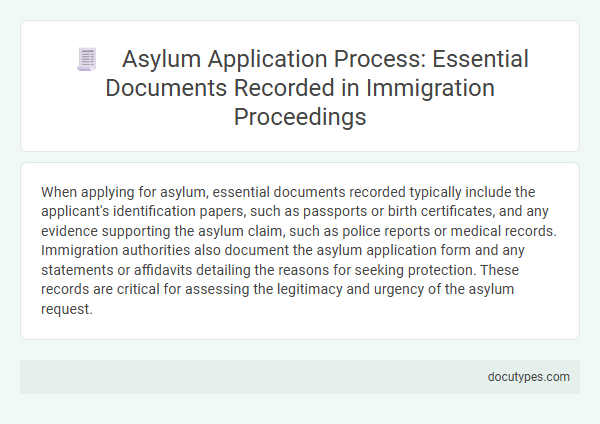When applying for asylum, essential documents recorded typically include the applicant's identification papers, such as passports or birth certificates, and any evidence supporting the asylum claim, such as police reports or medical records. Immigration authorities also document the asylum application form and any statements or affidavits detailing the reasons for seeking protection. These records are critical for assessing the legitimacy and urgency of the asylum request.
Overview of the Asylum Application Process
The asylum application process requires submitting specific documents to verify your identity and grounds for asylum. Understanding which documents are recorded helps ensure a complete and accurate application.
- Personal Identification Documents - Includes passports, national ID cards, and birth certificates to establish your identity and nationality.
- Evidence Supporting Asylum Claim - Consists of written statements, police reports, medical records, or any proof of persecution or threats faced.
- Application Forms and Legal Documents - Comprises the completed asylum application form and any related immigration or legal paperwork filed during the process.
Key Documentation Required for Asylum Claims
Which documents are recorded when applying for asylum? Key documentation typically includes your identification papers, such as passports or national ID cards, and evidence supporting your asylum claim. These documents help establish your identity and the reasons for seeking protection under international law.
Personal Identification and Biographical Records
When applying for asylum, personal identification and biographical records are crucial for establishing identity and background. These documents help immigration authorities verify your claims and process the application efficiently.
- Passport or National Identity Card - Official government-issued documents used to confirm your nationality and personal details.
- Birth Certificate - A certified record that verifies your date of birth and parentage.
- Biographical Information Form - Detailed forms that collect information about your family, education, and employment history.
Evidence of Persecution or Fear of Harm
When applying for asylum, one of the most critical documents recorded is evidence of persecution or fear of harm. This evidence helps establish the applicant's claim that returning to their home country would put them at risk.
Examples of such evidence include personal affidavits, medical reports of injuries, police reports, and witness statements. Country condition reports and human rights organizations' documentation can also support claims of persecution.
Supporting Witness Statements and Affidavits
When applying for asylum, supporting witness statements play a crucial role in corroborating the applicant's claims and providing credible evidence of persecution or threats. Affidavits are sworn written statements from witnesses that detail personal knowledge of the applicant's situation, enhancing the credibility of the asylum case. These documents are meticulously recorded and reviewed by immigration authorities to strengthen the applicant's case and facilitate a fair judgment.
Medical and Psychological Evaluation Reports
When applying for asylum, medical and psychological evaluation reports are critical documents that are recorded to support your claim. These reports provide evidence of physical injuries or mental health conditions resulting from persecution or trauma.
Medical reports include detailed records of any injuries, illnesses, or treatments linked to the applicant's experiences. Psychological evaluations assess conditions such as PTSD, depression, or anxiety caused by past persecution. These documents help establish the credibility and urgency of the asylum application.
Country of Origin Information and Reports
When applying for asylum, accurate and detailed documentation of the applicant's country of origin is crucial. Country of Origin Information (COI) and reports provide essential context for the asylum claim's validity and credibility.
- Country of Origin Information - Compiled data about political, social, and human rights conditions in the applicant's home country
- Government and NGO Reports - Analyses from recognized organizations that verify current risks and persecution trends
- Personal Testimonies and Evidence - Supporting documents that correlate with COI to strengthen the asylum case
These documents form the backbone of the asylum decision-making process by establishing a factual basis for the applicant's fear of persecution.
Filing Forms: I-589 and Related Immigration Forms
When applying for asylum, the primary document recorded is Form I-589, Application for Asylum and for Withholding of Removal. This form requires detailed personal information, including the applicant's identity, entry details, and background supporting their asylum claim. Supporting forms such as Form G-28, Notice of Entry of Appearance as Attorney or Accredited Representative, may also be recorded if legal representation is involved in the filing process.
Translation and Certification of Documents
| Document Type | Translation Requirements | Certification Requirements |
|---|---|---|
| Identification Documents (Passports, IDs) | All foreign language documents must be accurately translated into English by a certified translator. | A certification statement from the translator confirming the accuracy of the translation is required. |
| Birth and Marriage Certificates | Full translations including date formats and names are necessary, presented on official letterhead when possible. | Certification by a notary or an authorized official affirming the authenticity of the original document and translation. |
| Police Records and Court Documents | Complete translation of all text, including annotations and stamps, must be provided by a professional translator. | Certified translations need a signed affidavit or declaration regarding the translation's accuracy. |
| Medical Records | Translate detailed notes, prescriptions, and diagnoses fully into English to ensure clarity in review. | Certification through a translator's statement affirming the complete and true translation of the medical information. |
| Supporting Statements and Affidavits | Non-English statements require translation that preserves the original meaning and legal phrasing. | Certification by the translator confirming that the translation is a true and accurate representation of the original. |
| Important Note | You must submit all translated documents with certified translations to avoid delays in the asylum process and to ensure proper evaluation. | |
Which Documents Are Recorded When Applying for Asylum? Infographic

